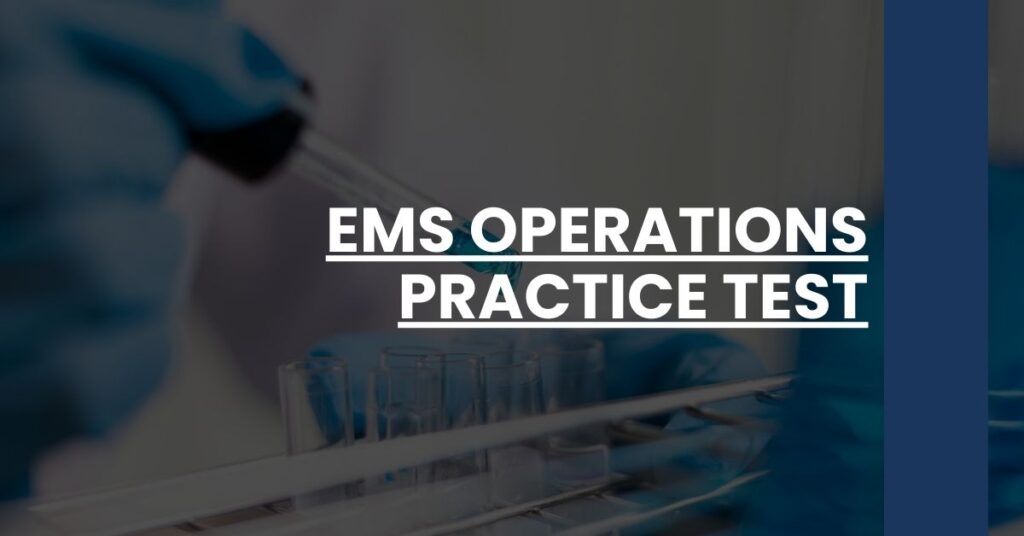Ace Your Exam with an EMS Operations Practice TestEMS operations practice tests are your key to mastering pre-hospital care exams.
- Real-World Scenarios: Experience hands-on scenarios that prepare you for on-the-job challenges.
- Time Management: Enhance your ability to efficiently tackle the time restrictions of the EMS exam.
- Confidence Boosting: Build your test-taking confidence with practice in a simulated exam environment.
Prepare to succeed with EMS operations practice tests.
- Understanding EMS Operations Tests
- Importance of EMS Practice Tests
- Types of Questions in EMS Operations Practice Tests
- Key Topics to Master for EMS Operations
- Best Practices for Utilizing EMS Operations Practice Tests
- Reviewing Your Practice Test Results
- Additional Resources to Supplement Practice Tests
- Preparing for the Test Day
- Conclusion: Moving Forward with Confidence
Understanding EMS Operations Tests
When you’re gearing up for a career in emergency medical services, acing the EMS operations section of your exam isn’t just a checkbox for certification—it’s a critical step in preparing yourself to effectively manage the multifaceted challenges of pre-hospital care environments. EMS operations practice tests are designed to measure your prowess in areas crucial to the well-being of the community you’ll serve.
What Are EMS Operations Practice Tests?
These tests center on the non-clinical aspects of emergency response. You’re not just tested on medical acumen but also on your ability to:
- Navigate the complexities of dispatch protocols
- Execute effective resource management
- Uphold communication procedures with precision
- Implement incident command systems adeptly
By integrating scenarios and simulations typical of real-world scenarios, these practice tests offer a robust rehearsal for actual responsibilities.
Why They Matter
Undoubtedly, they’re a springboard that propels your understanding from textbook theories to practical wisdom. Envision yourself mastering skills that aren’t just about saving lives directly but also about ensuring that the entire rescue process runs as seamlessly as an orchestra’s symphony due to your operational expertise.
Importance of EMS Practice Tests
Integrating EMS operations practice tests into your study routine is akin to rehearsing for a grand performance. The stakes are high, and practice becomes non-negotiable. These tests are not only about memorizing protocols; they’re about becoming fluent in the language of emergency readiness.
Building Your Confidence
Imagine walking into your EMS operations exam with unwavering confidence, knowing what to expect. Regular practice whittles away the edges of exam anxiety, sharpening your ability to tackle questions with clarity and precision.
- Acquaintance with Exam Format: Familiarity breeds confidence.
- Time Management: Hone your ability to allocate your minutes wisely.
- Feedback and Improvement: Turn your mistakes into milestones on your path to excellence.
Lowering Test Anxiety
When you sit down to take your exam, the familiarity with question types and structure curbs the butterflies in your stomach—it’s a scene you’ve rehearsed before, a performance you’re prepared for.
Types of Questions in EMS Operations Practice Tests
To conquer your EMS operations practice test, it’s pivotal to acquaint yourself with the variety of questions you may encounter. This section includes:
- Multiple-Choice Questions: They test your knowledge and your ability to apply it quickly.
- Scenario-Based Prompts: Placing you in the midst of a hypothetical situation, these questions assess your decision-making prowess under pressure.
- Critical Thinking Challenges: These questions encourage you to think beyond the textbook, applying your knowledge to complex, nuanced situations.
Each question type steers your study efforts differently, ensuring that your preparation is as comprehensive as the services you will provide.
Key Topics to Master for EMS Operations
Aspiring to pass your EMS operations practice test with flying colors? Your focus should be as much on the depth as the breadth of study. Here lie the pillars of knowledge that you must fortify:
Incident Management
How will you coordinate an emergency response? Understanding the frameworks of incident command and precisely how to enact them is indispensable.
Safety Operations
Your own safety and the safety of your team are paramount. Grasping protocols and procedures that mitigate risks form the bedrock of this topic.
Communication Procedures
The transmission of information can make the difference between chaos and coordinated effort. Mastery of EMS communication channels and protocols is critical.
Diving deep into these areas ensures that when the time comes, you’re not just performing tasks—you’re upholding standards that define excellence in emergency services.
Learn more about the significance of these subjects within the EMS spectrum.
Best Practices for Utilizing EMS Operations Practice Tests
Well-crafted EMS operations practice tests are a treasure trove of knowledge and skills waiting to be unlocked. But, like any resource, their value is contingent on how they are utilized. Below are the best practices to utilize these tests to your full advantage.
Incorporate Frequent Testing into Your Study Routine
- Consistent Practice: Regularly schedule practice tests. This regularity not only keeps the information fresh but also reinforces learning.
- Realistic Testing Environment: Create an environment similar to the exam conditions. This could mean setting a timer, finding a quiet location, and ensuring you have all necessary materials at hand.
- Monitor Your Progress: Keep track of your scores and improvement over time. This allows you to visually see where you’re improving and where additional study may be needed.
Identify and Address Your Weaknesses
- Analyze Your Results: Following each practice test, take time to go over your incorrect answers. Understanding why you chose the wrong answer is as important as knowing the right one.
- Seek Clarification: If a particular scenario or question type consistently trips you up, don’t hesitate to seek out additional materials or assistance to clarify your understanding.
Simulate Real Exam Conditions
- Strict Timing: During practice tests, adhere to the same time constraints you will face during the actual exam. This helps hone your ability to perform under pressure.
- Avoid Interruptions: Simulate exam day conditions by eliminating interruptions and distractions.
By following these best practices, your familiarity with EMS operations and your ability to navigate through the practice test spectrum will be significantly enhanced.
Reviewing Your Practice Test Results
The moment after you complete an EMS operations practice test is ripe with learning opportunities. Reviewing your practice test results is critical to making the most of your preparation.
Analyze Your Performance
- Spot Recurring Issues: Identifying patterns in your errors can unveil underlying issues with certain topics or test-taking strategies.
- Review Explanations: For each incorrect response, reviewing the explanations can provide insights that are often missed at first glance.
Adjust Your Study Plan
- Reallocation of Study Time: If you notice consistent weaknesses, it may be time to adjust your study plan to allocate more time to those areas.
- Focus on Application: Knowing the facts is one thing, but being able to apply that knowledge is another. Concentrate on areas where application of knowledge falls short.
Thoroughly deconstructing your practice test results will pave a way for a more focused and effective study plan, thereby inching you closer to a successful outcome when you take the actual EMS operations assessment.
Additional Resources to Supplement Practice Tests
Practice tests are the centerpieces of your study plan, but they should not be the only resource upon which you rely. A multitude of additional study aids are at your disposal to complement your practice tests.
Enhance Your Study Material
- Industry Textbooks: Dissect EMS textbooks that are upheld as the gold standard for your field. They offer comprehensive explanations and a structured approach to complex procedures.
- Online Courses: Invest time in online courses specifically geared towards EMS operations, many of which offer interactive elements that can solidify your knowledge.
Join Workshops and Training
- Practical Workshops: Physical or virtual workshops conducted by seasoned EMS professionals can give you the insider’s edge in operational proficiency.
These supplemental resources can fortify your preparation and contribute substantially to your understanding of EMS operations—a synergy that could very well be reflected in your test results.
Preparing for the Test Day
As you approach the culmination of your EMS operations study journey, preparing for test day involves more than mere revision. It’s about fine-tuning your body and mind for peak performance.
Fortify Your Body
- Rest Adequately: Ensure you get a good night’s sleep before the test day. A well-rested body can significantly enhance cognitive function.
- Nutrition: On test day, eat a balanced meal that provides sustained energy without the slump.
Condition Your Mind
- Relaxation Techniques: Explore meditation, deep-breathing exercises, or even a brief walk to alleviate test day jitters.
- Positive Mental Attitude: Foster a mindset of success. Visualize your success in the exam, reinforcing a positive frame of mind.
Preparing for the test day holistically, considering both your physical and mental state, can have a profound influence on your performance.
Conclusion: Moving Forward with Confidence
By comprehensively understanding the importance of EMS operations practice tests, mastering the content, and employing a proactive study strategy, you’re setting a strong foundation for success. As you move forward, weaponized with knowledge and practical insights, remember that each practice test is a step on the pathway to mastering your craft. Confidence comes with preparedness, and with this guide, you’re well on your way to excelling in your future as an EMS professional.

